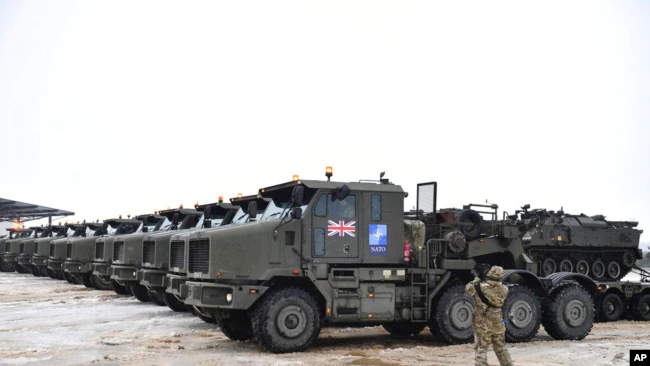NATO deploys Response Force to eastern flank as Russian forces advance on Kyiv
NATO leaders have authorized for the first time the deployment of the alliance’s Response Force team to defend the eastern flank of the alliance, as Russia’s invasion of Ukraine extends Moscow’s military power to the borders of several of the alliance’s member states.
It is the first time the treaty’s response force has been used for collective security, NATO Secretary-General Jens Stoltenberg told reporters during a media conference at NATO headquarters in Brussels on Friday.
“We are deploying elements of the NATO Response Force on land, at sea, and in the air to further strengthen our posture and to respond quickly to any contingency,” Stoltenberg said, adding that countries bordering the conflict in Ukraine are “extremely concerned.”
“There must be no space for miscalculation or misunderstanding. We will do what it takes to protect and defend every ally and every inch of NATO territory,” Stoltenberg said.
“This goes far beyond Ukraine,” Stoltenberg said. “This is about how Russia is actually challenging, contesting core values for our security.”
NATO said it will continue to deploy troops as necessary to “ensure strong and credible deterrence and defence across the Alliance, now and in the future.”
”Our measures are and remain preventive, proportionate, and non-escalatory,” the statement said.
The unit has 40,000 troops and consists of land, air, and naval forces.
NATO Secretary-General Jens Stoltenberg didn’t say how many soldiers would be deployed. But he said Russia has shattered peace in Europe and that the people of Ukraine are fighting for their freedom in the face of Moscow’s unprovoked invasion.
Thousands of soldiers from the US, Canada, and European nations have already been sent to shore up NATO’s eastern flank. They will not enter Ukraine because it is not a member of the alliance. But NATO will provide more weapons and equipment to Ukrainian forces.
NATO leaders also released a statement saying they made every effort to pursue a dialogue with Russia. They say they invited Russian officials to sit down for talks repeatedly but received no response. They also described statements out of the Kremlin as a “barrage of lies.”
President Joe Biden was among the NATO heads of state who met Friday morning to coordinate the treaty organization’s next moves as Russian President Vladimir Putin pushes forward with his full assault on his western neighbor. Russian forces encircled and entered Kyiv on Friday, prompting Ukrainian citizens to take up arms and braced for an intense battle. The NATO deployment along its eastern flank also comes as the U.S. warned that Moscow’s ultimate goal is “decapitating the government” in Kyiv and establishing a Russian-backed government in Ukraine’s capital.
“President Putin has failed in his goal of dividing the West. NATO is as united and resolute as it’s ever been, and NATO will maintain its Open Door to those European states who share our values and who one day may seek to join our Alliance. As we navigate this crisis, we pledged to work even more closely together in our defense of freedom and the democratic values that imbue our Alliance with purpose and power,” the White House said in a statement.
NATO’s priority is the defense of its members, said Claudia Major of the German Institute for International and Security Affairs. “European countries and NATO countries have to prepare for the repercussions of the war in the military domain, so assuring the defense of their own countries, [while] supporting Ukraine as much as they can,” Major said. “They have to get prepared for the nonmilitary repercussions, like refugees, for example.”
It would be recalled in a speech before the attacks began, Putin claimed he had been left with “no other option” but to invade Ukraine because “the war machine is moving and … coming close to our borders”, referring to NATO.
Russian forces attacked far beyond the conflict-ridden zones of eastern Ukraine, where Moscow-backed separatists run areas recently recognised by the Kremlin as independent, with air attacks hitting apartment blocks in Kharkiv and beyond.




